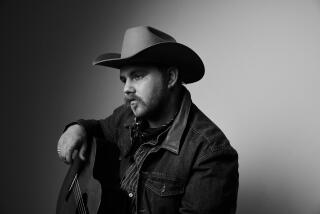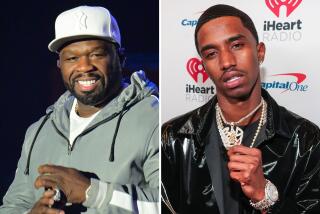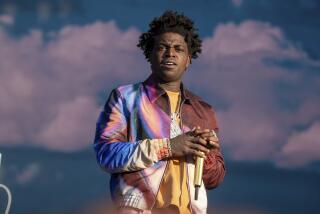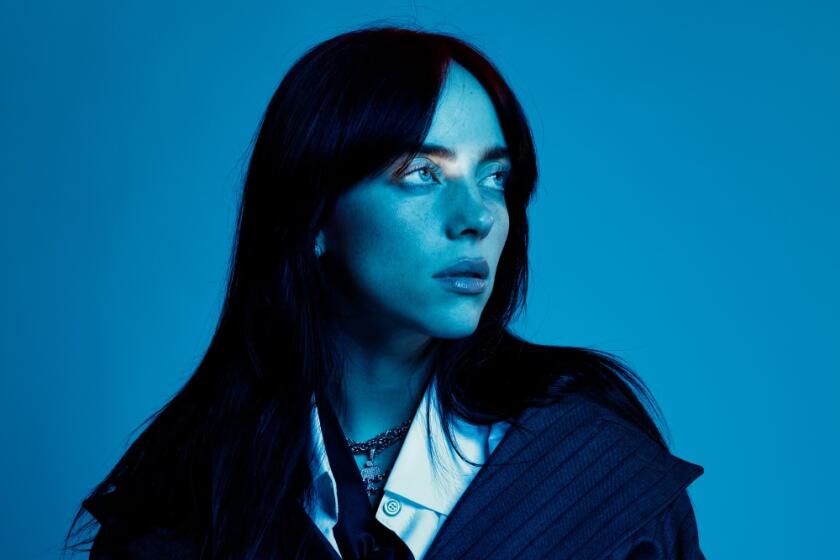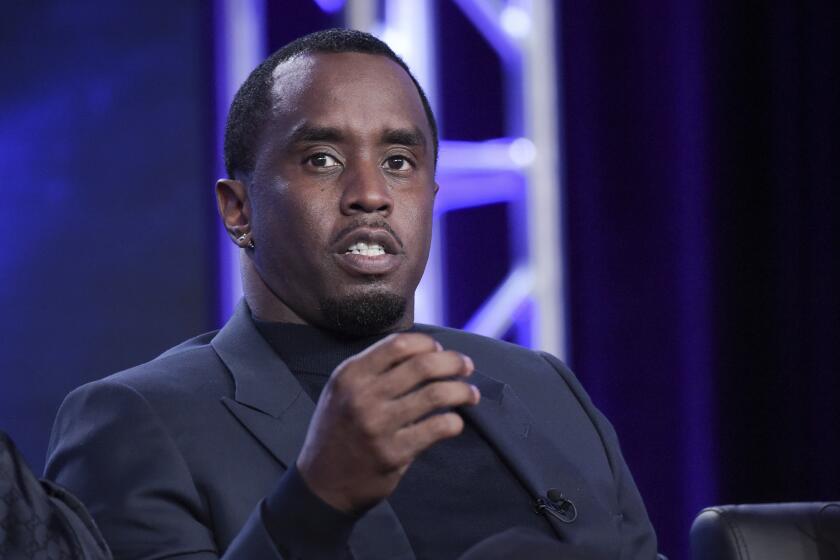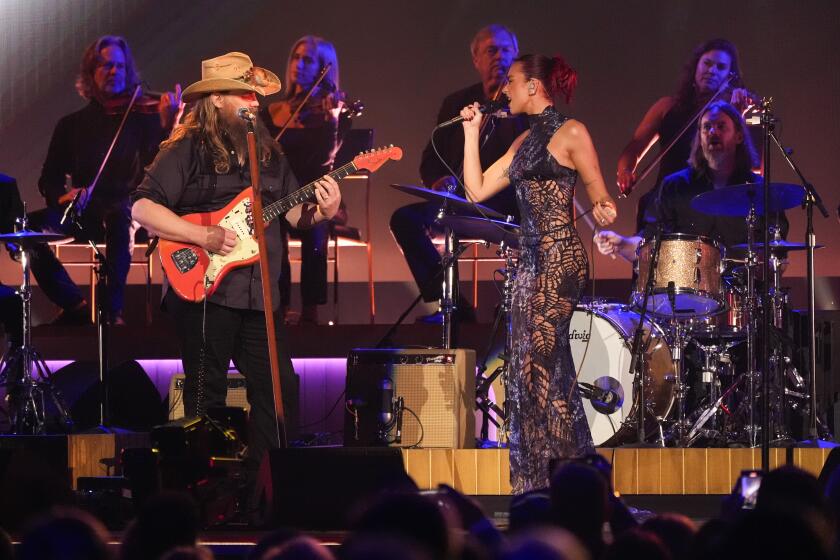If Music’s Involved, Deal Him In : He riffs with the Philharmonic New Music Group, plays rock and makes jazz--there’s just no classifying guitarist Bill Frisell.
When the mild-mannered, bespectacled Bill Frisell hunches over his instrument, what comes out is akin to a garden of mutant plants with bizarrely configured beauty. Call him the Dr. Seuss of electric guitar. He uses an array of gadgets--volume pedal, distortion unit, digital delay--but the end result is always organic, with sentence-fragment jazz lines, bluesy riffs, country-Western homilies and swatches of sonic abstraction. All this, and a range of tone that evokes pedal steel, the violin, even the clarinet.
A tall man who walks softly, Frisell attends to his duties without fanfare or typical guitar-hero posturing. It’s almost as if he is surprised by the fruits of his efforts. In conversation, he ponders ideas slowly and searches for the right words, which often elude him. In short, Frisell is one of modern music’s humbler icons.
“Sometimes I can’t stand the sound of (the guitar),” Frisell admits. “I get so tired of it. Maybe that’s what pushes you to find something new on it. But then I also love it. It’s such a great little miniature orchestra. The potential of it is huge. With the guitar, I can pretty much play, or get close to, any music that I’m imagining in my head.”
And his imagination seems boundless. Frisell’s hallmark is that he does everything. Over the years, the tag used to describe him has changed from “jazz guitarist” to “new music guitarist,” but the truth is, he can’t be tied to any genre or movement.
Nowadays, he plays jazz (mostly) with his own group, the Bill Frisell Band (Frisell, bassist Kermit Driscoll and drummer Joey Baron) and also with an ensemble headed by drummer Paul Motian. His side projects include collaborations with the likes of rockers Marianne Faithful and former Cream drummer Ginger Baker, and jazz types such as David Sanborn and Paul Bley.
This week, in a rare Los Angeles appearance, Frisell will crossover into longhair territory, riffing with the Los Angeles Philharmonic as a featured soloist in Monday’s Green Umbrella concert at the Japan America Theatre.
In a phone interview, Frisell defines his career as a series of never-ending lessons. “Everything is this gradual, step-by-step evolution that keeps going on,” he says. “I just keep heading hopefully forward. Twenty years ago, I’d learn a new scale or something, and a whole new world would open up from one week to the next. Now, it’s really just chipping away.”
Frisell’s upcoming appearance with the Philharmonic actually comes courtesy of composer Steven Mackey. Backed by the orchestra, Frisell and drummer Baron will perform the world premiere of “Deal,” which Mackey also calls a Double Concerto for Electric Guitar and Optional Drum Kit.
For centuries, composers have written works targeted for--or inspired by--specific musicians. But Mackey’s “Deal,” commissioned by Betty Freeman, L.A.’s grande dame of new music patronage, is an especially acute example of composer-performer symbiosis. Mackey knew he wanted Frisell at the center of the work, and he started by trying to create a conventional concerto score, with the guitar part specifically noted. Then he had a light bulb moment. He realized that the best way to write for Bill Frisell was not to write for Bill Frisell. Instead, he composed around the guitarist, creating a space in which Frisell and Baron would improvise.
“Here I was,” Mackey says by phone from Princeton University, where he teaches, “trying to write stuff that would capture Bill’s style, and I could just see him squinting through those big, thick glasses of his, reading all these directions that were basically a recipe for how to be Bill Frisell.
“What he does is what I’ve been trying to do with electric guitar in other ensembles when (the piece is) fully notated. I wanted to put him in this other real world where it was challenging, and where virtuosity would be measured in terms of how well it blended. That wouldn’t be the same if I were writing for someone else. For instance, the orchestra suggested (using) Eric Clapton. I like Eric Clapton, but if he were doing it, I would have written it a lot differently, with some blues themes or something. With Bill, I was really thinking, ‘He can do anything. He’ll find a way to deal with anything I come up with, because he’s my brother.’ ”
Which at least in part explains the work’s title. “Deal” is broken up into 52 separate phrases--cards in a deck, according to Mackey. “And then,” he says, “there are two improvised factors, which I call wild cards. That’s one of the ‘Deal’ connections. Another link is that, all along, I’m saying, ‘They’ll deal with it.’ ”
Frisell speaks with a touch of awe about the combination of freedom and restraint required by “Deal.” “There are really no written melodies that (Joey and I) play, or set rhythms. At the same time, we have to know the orchestra part. Then there are specific ideas Mackey has at certain key points, but we’re also free to discard his ideas if we want to. He’s really cool about all that.”
Frisell, 42, was born in Balti more and raised in Denver. In the mid-’70s, he studied at the Berklee School, a jazz mecca in Boston, and with jazz guitar legend Jim Hall in New York City. By the end of the decade, he had become a key player in New York’s downtown new music-jazz scene.
After appearing on ECM jazz albums, notably with Norwegian saxophonist Jan Garbarek, Frisell began to display his own unique qualities as a composer-bandleader-player, beginning with the compelling but hard-to-find import solo album “In Line” on ECM in 1982, and his first domestically available solo effort, “Rambler.”
In the ‘80s, his projects included work on Hal Willner-produced tribute albums to Nino Rota, Walt Disney and Charles Mingus; an album with Living Color guitarist Vernon Reid, and performances with John Zorn’s now-defunct rock band Naked City.
By 1989, the Bill Frisell Band was established, and Frisell was married and had a baby daughter. Her arrival inspired him and his wife, Carol, to exchange life in New York (Hoboken, N.J., to be exact) for more family-friendly Seattle. Frisell now spends half the year in the U.S. and half in Europe, a cultural climate that’s very friendly to his non-mainstream ventures.
O f late, a good portion of Fri sell’s activity has focused on composition. He has created scores for three Buster Keaton silent films, which were just released on CDs by Nonesuch.
“That’s, for me, the biggest learning experience I’ve had lately,” Frisell says, “having to decide what I think something I’ve written means and put it up against an image.”
In the coming months, Frisell’s group plans to perform the Keaton scores at screenings of the films, with a possible performance in Los Angeles this summer.
He will also continue his 15-year association with the Paul Motian Group, which includes Frisell, Motian and tenor saxophonist Joe Lovano. “It has somehow worked its way into this trio that is pretty amazing. We don’t really have to talk about anything,” Frisell comments. “It’s amazingly easy, but it’s still challenging. Every night, I still get nervous.”
Is nervousness a good sign?
“A little bit, yeah. As soon as we start playing, it usually goes away. But I’m often thinking, ‘I wonder if it’s going to happen, or if I’m going to mess something up.’ You never know.”
Ever self-effacing, Frisell talks about his still-growing and still-mutating career with something like surprise. “It wasn’t that long ago that I never even dreamed that I’d ever make a record or get to play with any of the people who I have or have articles in newspapers or magazines or be in a Down Beat poll. It totally blows my mind. In my own mind, in what I’m doing, I have so far to go. I’m nowhere close to having it together, that’s for sure.
“I realize that I’ve done something, but sometimes I don’t know if I deserve this. There are people all over the place playing incredible music who don’t get any kind of attention. I heard a guy playing on the street around Christmastime, an old guy playing the blues. It was some of the heaviest stuff I ever heard in my life, and he was just playing for change.” He paused. “Music is weird.”
Frisell tries not to concern himself with the ongoing struggle to define what he does. “I have no control over it, so it makes no sense to worry about it much.”
The tag of Americana--albeit warped Americana--has hovered over his music most recently, with the release of a CD called “Have a Little Faith”--his versions of music by Copland, Ives, Madonna, Bob Dylan, Sonny Rollins and others, and the new Keaton soundtracks.
“People will call (my music) something,” he says. “What bothers me is that, as soon as someone puts a name on something, then you get put in a box and then they perceive you one way and don’t give you a chance to do other things.”
When he hits town to deal with “Deal” and the Philharmonic, Frisell will be crossing another border, with the proper amount of nervousness. “Anything where I can learn something new--that’s the whole idea. This is definitely going to be a challenge, so that’s the best reason to do anything, if it’s going to cause me to grow.”*
* “Deal,” Japan America Theatre, 244 S. San Pedro St. Monday, 8 p.m. $10-$13. (213) 365-3500.
More to Read
The biggest entertainment stories
Get our big stories about Hollywood, film, television, music, arts, culture and more right in your inbox as soon as they publish.
You may occasionally receive promotional content from the Los Angeles Times.
